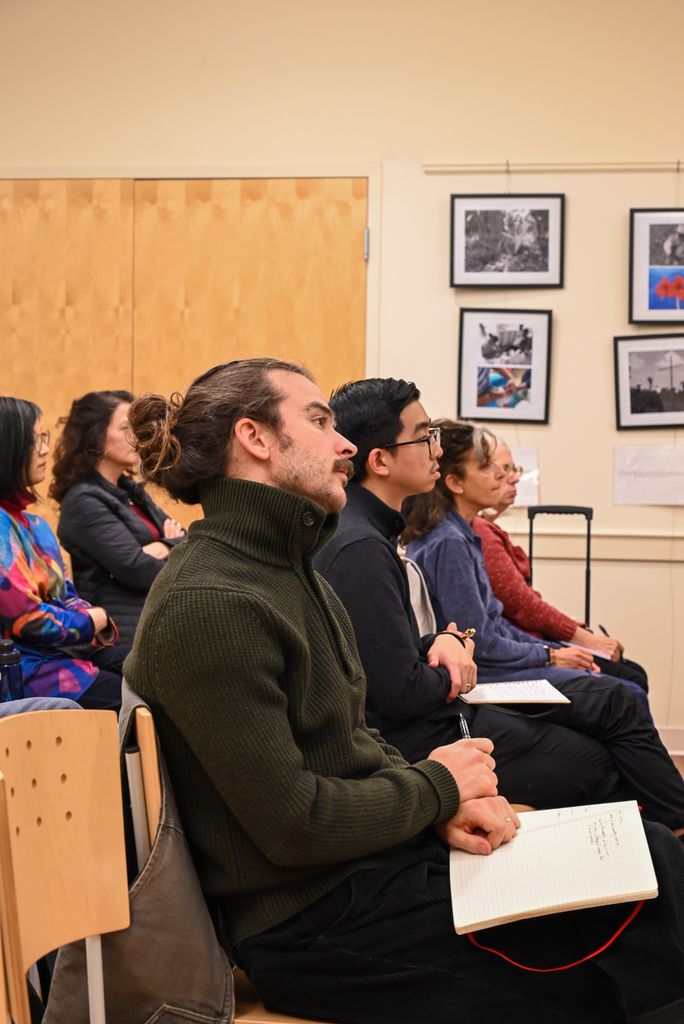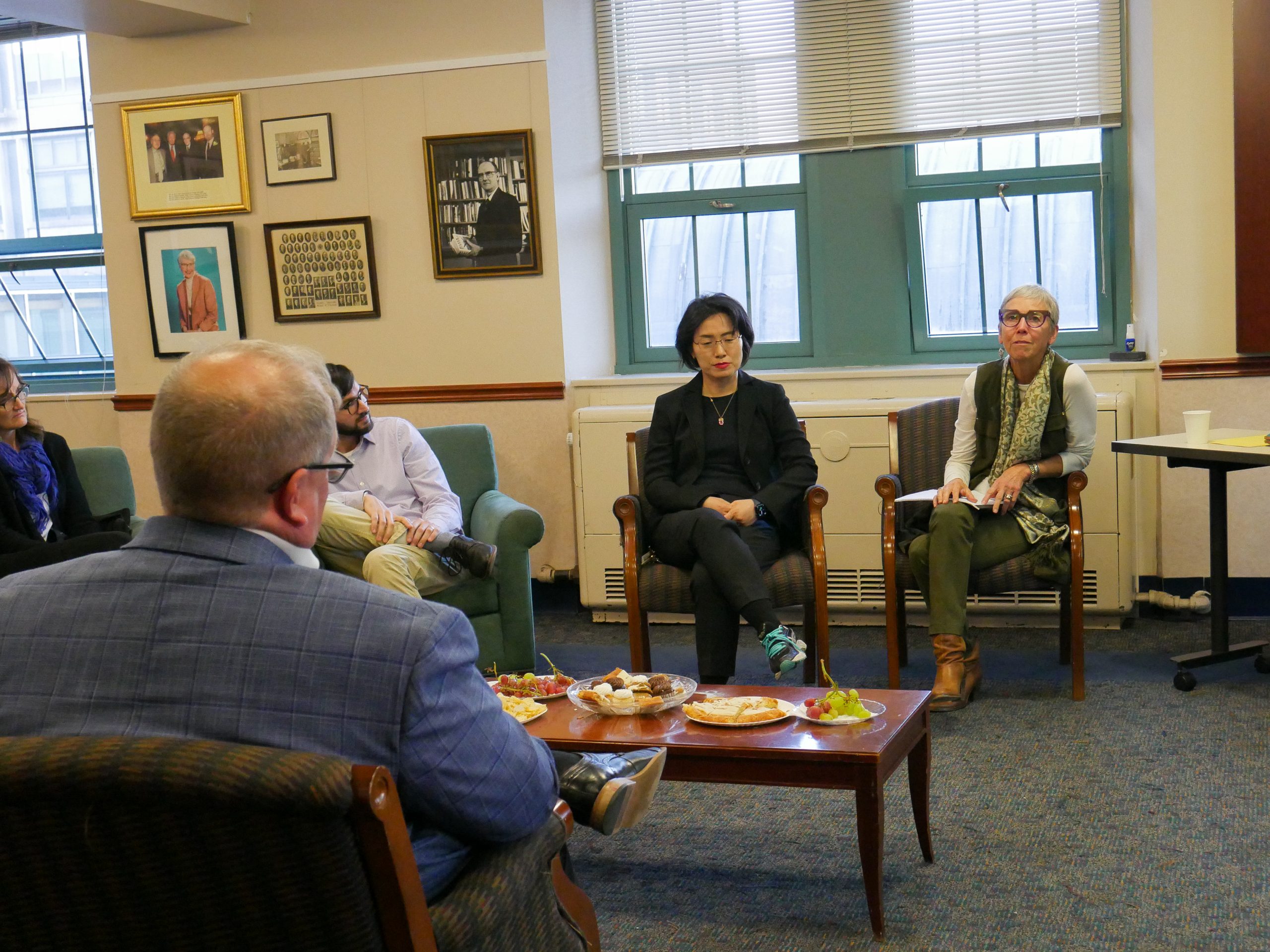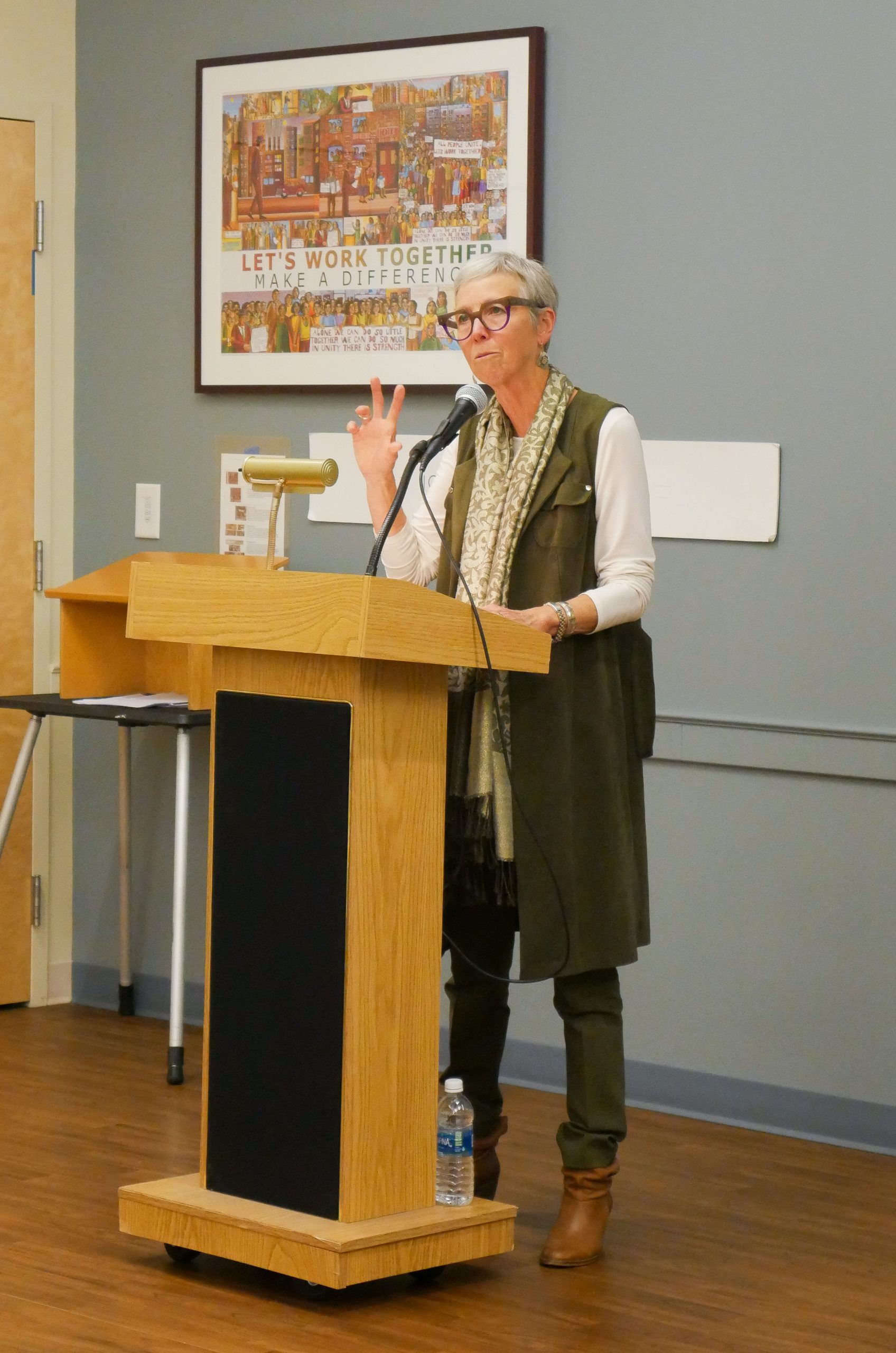CPT Today
CPT Today is the blog of The Center for Practical Theology. Here you’ll find posts under the categories of Book Reviews, News and Events, Opportunities, Perspectives, Practical Theology Profiles, and Research Reflections. Interested in submitting? Please see our submission guidelines and feel free to be in touch with Rebekah Neuberger at cpt@bu.edu with any questions!
2023 Annual Lecture
On November 1, 2023, Dr. Thomas Beaudoin, professor at the Graduate School of Religion and Religious Education at Fordham University, joined the Center for Practical Theology as the speaker for the CPT's 16th Annual Lecture.

Before his lecture in the evening, Dr. Beaudoin held a conversation with Ph.D. students studying practical theology. He discussed his research and methodology, as well as the arc of his various academic focuses throughout his career. The Ph.D. students and Dr. Beaudoin also discussed interdisciplinary scholarship amidst their shared intensive study of practical theology. The event, which was moderated by CPT Co-Director Dr. Claire Wolfteich, was well received by students.

Dr. Beaudoin began his lecture at 5 pm, following the opening remarks of CPT Co-Director Dr. Eunil David Cho, who acted as the respondent for the CPT's 15th Annual Lecture. Dr. Beaudoin's lecture was titled "Practical Theology in the Pantheon: Reckoning with a More-Than-Christian Church." His lecture addressed the present and future possibilities of practical theology in an interfaith world. You can view the lecture using this link: https://vimeo.com/showcase/10645588/video/876067256

Associate Dean of Academic Affairs, and CPT Co-Director, Dr. Bryan Stone served as a respondent to Dr. Beaudoin's lecture. Afterwards, attendees were welcome to ask Dr. Beaudoin about his research and share a bit about their own. It was a delight to welcome Dr. Beaudoin as our esteemed speaker for the 16th Annual Lecture, and we are grateful for all that he shared with the School of Theology faculty, staff, and students!
 .
. 
BUSTH Faculty, Students, and Alumni Attend 2023 International Academy of Practical Theology Conference in Seoul

Read Dr. Eunil David Cho's summary of the IAPT conference below:
CPT 2023 Newsletter
The newest issue of the Center for Practical Theology Newsletter is available below. You can download the newsletter via this link.







Homiletical Theology Project Fall Consultation Announcement
We are thrilled to share this exciting announcement of The Homiletical Theology Project's upcoming consultation on "Spirituality, Preaching, and Bridging Racial Divides: Exploring Black Contemplative Preaching." More details to come!

CPT Welcomes New Co-Director Dr. Eunil David Cho
 The Center for Practical Theology is happy to announce the addition of a new Co-Director, Dr. Eunil David Cho.
The Center for Practical Theology is happy to announce the addition of a new Co-Director, Dr. Eunil David Cho.
Dr. Cho is an Assistant Professor of Spiritual Care and Counseling at the Boston University School of Theology (STH). He is a practical theologian whose research in pastoral theology and spiritual care, especially among immigrant and refugee communities, engages the fields of narrative theories, psychology of religion, and sociology of religion. He approaches spiritual care from the position of an ethnic and racial minority by integrating proficiency in critical race theory, global migration, qualitative research methods, and Asian American studies. As a scholar-practitioner, he is committed to teaching out of his personal and academic expertise as an ordained minister in the Presbyterian Church (USA) and a chaplain in a way that contributes to the transformation of personal, communal, and public life.
He is in the process of completing his first book titled, Making Sense of Life with God: Religious Stories Dreamers Tell in the Face of Uncertainty (Brill’s Theology in Practice Series). He is on the steering committee of the Society for Pastoral Theology (SPT) and in 2022, became the co-editor-elect of the Journal of Pastoral Theology. He is also a former editor (2016-2018) of Practical Matters: Journal of Practical Theology and Religious Practices at Emory University's Graduate Division of Religion. Recently, Dr. Cho became the project consultant for the Trauma-Responsive Congregations project at STH, which is led by Dr. Shelly Rambo and generously supported by the Lily Endowment.
Recently, Dr. Cho served as a respondent for the CPT's 15th Annual Lecture. The CPT is excited about Dr. Cho's work in the field and looks forward to further utilizing his experience and expertise.
2022 Annual Lecture
On November 9, 2022, Dr. Bonnie Miller-McLemore, Professor Emerita of Religion, Psychology, and Culture at the Divinity School and Graduate Department of Religion of Vanderbilt University, joined the Center for Practical Theology as the speaker for the CPT's 15th Annual Lecture.
Miller-McLemore first met with the students and faculty of the School of Theology's Ph.D. program in Practical Theology. Those gathered enjoyed coffee and conversation about their work in the field, moderated by CPT Co-Director Dr. David Jacobsen.

Next, attendees greeted one another during a reception at 5:30 pm, where they treated themselves to food and refreshments. 
Miller-McLemore began her lecture at 6 pm, following the opening remarks of STH Dean Sujin Pak and CPT Co-Director Dr. Claire Wolfteich. Her lecture was titled "Understanding Lived Theology: Is Qualitative Research the Best or Only Way?" She addressed many topics that are pertinent to the discipline and the shape of the CPT's work. You can view the lecture using this link: https://livestream.com/accounts/4958196/events/10665402/player?width=640&height=360&enableInfoAndActivity=true&defaultDrawer=&autoPlay=true&mute=false

Dr. David Cho, Assistant Professor of Spiritual Care and Counseling, served as a respondent to Miller-McLemore's lecture. This opened space for other attendees to offer their own perspectives and ask questions. It was a pleasure to engage in such rich discussion at our first in-person event since the pandemic.

Livestream Option Available for Annual Lecture
We hope you will join us this Wednesday, Nov. 9, for the CPT's 15th Annual Lecture.
Those who cannot attend in-person may livestream the event on STH’s Livestream page. The recorded lecture will begin at 6 pm.
Alumni Book Announcement: Preaching to Korean Immigrants
 Dr. Rebecca Seungyoun Jeong is a graduate of BU School of Theology's PhD program in Practical Theology, class of 2019. Dr. Jeong now works as an Assistant Professor of Preaching and Intercultural Studies at Portland Seminary, George Fox University. She recently developed her dissertation research into a book with Palgrave Macmillan. The book is titled Preaching to Korean Immigrants: A Psalmic-Theological Homiletic and is now available for purchase.
Dr. Rebecca Seungyoun Jeong is a graduate of BU School of Theology's PhD program in Practical Theology, class of 2019. Dr. Jeong now works as an Assistant Professor of Preaching and Intercultural Studies at Portland Seminary, George Fox University. She recently developed her dissertation research into a book with Palgrave Macmillan. The book is titled Preaching to Korean Immigrants: A Psalmic-Theological Homiletic and is now available for purchase.
The book "proposes a more appropriate immigrant theology for/in the practices of preaching by reclaiming the priorities of God's future in our lives and confirming God's active identification with Korean immigrant congregations in the depth of their predicament."
Learn more here. Congrats, Dr. Jeong!

Book Launch: Theology, Religion, and Dystopia
By: Scott Donahue-Martens, PhD Candidate in Homiletics
During my M.Div. studies I took a class that explored intersections between the gospel and fantasy literature. This course kindled a type of theological thinking within me that I never would have imagined. The professor, Dr. Osmer inspired me to incorporate fantasy literature insights and interactions in my preaching, chaplain work, and teaching. I found that the popular culture insights connected with parishioners, patients, and students so I’ve continued to reflect on the gospel in light of some elements from popular culture. Popular culture offers opportunities for connection because authors frequently imbue their works with meaningful moral dilemmas and rich religious insights, speaking to widely shared human experiences. I’ve found that popular culture opens an imaginative space that can be fertile for the work of practical theology. Because works of popular culture frequently present a problem or situation for religious and theological thinking, readers are invited to interpret ultimate reality, God, or gospel in dialogical manners.
Popular culture media have become a meeting place for conversation and meaning making as friends gather around screens and books. Theological and religious thinking are common in popular culture and often represent popular understandings of religion and theology. While it might be tempting to scoff at some of the religious and theological portrayals, I think it is important to engage them with seriousness as they perform a formative function for people in the United States and around the world. Whether it is the largely post-Christian imagination employed in the show The Good Place or Octavia Butler’s gripping narrative the The Parable of the Sower, works of popular culture often stimulate theological and religious thinking for those who critically engage them. The past decade has seen an increased number of dystopian narratives in popular culture. The Hunger Games and the adaption of The Handmaid's Tale are two examples of dystopian works which have captured the imagination of audiences while disclosing systematic concerns in the actual world.
At the start of the COVID-19 pandemic, I wondered what a collection of chapters at the intersections of theology, religion, popular culture, and dystopia might look like. Dr. Simonson and I asked ourselves why dystopia was on the rise in popular culture and whether theology and religious studies could offer insight into what this suggests about society. Convinced that dystopia had some connection to ancient apocalyptic literature, we launched into conversation with modern and ancient texts as a way of exploring the pre-pandemic and pandemic world.
 After engaging initial conversations, and gathering other interested scholars to contribute chapters, Dr. Simonson and I are pleased to share that our co-edited volume Theology, Religion, and Dystopia has been published by Fortress Academic and is available for purchase. The book covers a variety of dystopian situations; Interstellar, The Hunger Games, The Walking Dead, The Giver, and Asimov’s Foundation are some of the dystopian works that received chapter length attention. Those interested in eco-theology, queer theology, capitalism, and violence in popular culture will find resonating chapters and analyses of relevant dystopian visions as well. The book is almost evenly divided among authors who primarily take theological approaches and those who engage dystopia through the discipline of Religious Studies. STH Hebrew Bible students from the past few years will recognize topics like demythologization, apocalyptic, and prophetic eschatology, and many contributors have some connection to STH. In the first chapter, which provides a framework for dystopia, we argue that dystopia can be understood as demythologized apocalyptic, drawing from both religious and theological studies. The volume seeks to understand popular culture’s turn to dystopia and the implications for well-being in the 21st century.
After engaging initial conversations, and gathering other interested scholars to contribute chapters, Dr. Simonson and I are pleased to share that our co-edited volume Theology, Religion, and Dystopia has been published by Fortress Academic and is available for purchase. The book covers a variety of dystopian situations; Interstellar, The Hunger Games, The Walking Dead, The Giver, and Asimov’s Foundation are some of the dystopian works that received chapter length attention. Those interested in eco-theology, queer theology, capitalism, and violence in popular culture will find resonating chapters and analyses of relevant dystopian visions as well. The book is almost evenly divided among authors who primarily take theological approaches and those who engage dystopia through the discipline of Religious Studies. STH Hebrew Bible students from the past few years will recognize topics like demythologization, apocalyptic, and prophetic eschatology, and many contributors have some connection to STH. In the first chapter, which provides a framework for dystopia, we argue that dystopia can be understood as demythologized apocalyptic, drawing from both religious and theological studies. The volume seeks to understand popular culture’s turn to dystopia and the implications for well-being in the 21st century.
For more information and a table of contents, follow the publisher’s link: https://rowman.com/ISBN/9781978713291/Theology-Religion-and-Dystopia
CPT 2022 Newsletter
This year’s issue of the CPT Newsletter is found below. Click here to download.






